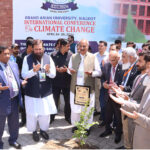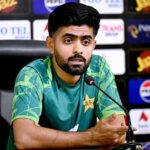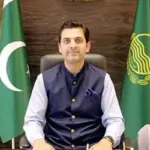ISLAMABAD, Dec 15 (APP): President Dr Arif Alvi Tuesday said that Indian society was actually falling apart due to the extremist ideology propagated by Rashtriya Swayamsevak Sangh (RSS) founders and frantically pursued by the Bharatiya Janata Party through its Hindutva policies.
In an exclusive interview with the South Asian Strategic Stability Institute (SASSI), a renowned think tank and telecast by PTV, the president said what was happening in Indian Illegally Occupied Jammu and Kashmir (IIOJK) was a continuous momentum built up for long by whipping up anti-Muslims and anti-minorities policies including forced conversion of Christians by the RSS zealots inside India.
All was done with objectives to rewrite history of India by isolating Muslims and excluding the Muslim era and their contributions by labelling them as something bad for Hindus or India, he added.
“What we do when we talk about Kashmir, it is not Kashmir alone, it is the momentum of whatever has been happening in India, which has been anti Muslim, which has been anti-minorities, not only Muslims, but all minorities,” he added.
The president further said there was an Arya Samaj situation created by one of the Hindu Mahasbahi in the late 19th century who talked about it by taking pride in the fact that the Arya Samaj, the religious Hindu culture was important, but then came some writings from Savarkar , in 1923 in which he talked about Hindutva.
In his writings he specifically pointed out to three or four things over which he wanted the commitment of Hindus to a fatherland of India, the motherland of India and the religion of India, the president said while tracing back history of RSS.
He said from there, the Hindutva momentum started and then different people led this in different manner, but ultimately, the RSS which came into being, in two or three years later after Savarkar, the organization had very important members like Modi and Advani.
RSS was a violent organization, and the founders of RSS were those like Gowalkar and those who appreciated Hitler’s role rather than depreciated it, the president observed.
“Ultimately, the continuous push towards a Hinduisation of India led to what has happened in India, against the Muslims and against all minorities,” he added.
In response to a question, the president referred to a book of Khushwant Singh ‘End of India’ written during 2002, in which the author said “India is going to dogs”….“And unless a miracle saves us, the country will break up, but not broken up by Pakistan or any other foreign power, which will destroy us we will commit harakiri, we will destroy India ourselves.”
The president said that secular story about India had been changed. The countries which had made progress, had inclusive institutions which were neither extractive or exploitative whereas, India was going in the reverse direction with persistent economic haunting of Dalits, the Muslims and other minorities.
The president to a query replied that all commissions, which were formed in India to look at the minorities class, found that there was a bias against them institutionally and within Indian society.
“So, you have a Muslim population, which according to Indian estimates, maybe about 13 to 15%, but you have almost only one or two per cent representation in the parliament. So, there is no reflection in the economy, they are further poor,” he observed.
About demolition of Babri Mosque, the president said it had alarmed the Muslims and all people even within India with the rising religious bigotry in India.
He said contrary to it, in Pakistan, the minorities religious historical sites had been preserved like those of greatest number of artifacts of Buddhism which were considered as heritage structures throughout the world.
“We preserve the sites of Mohen Jo Daro, not because of any religious intent, but just the fact that these are preservable sites,” he added.
The president expressed his wonder as to how could on the basis of religious prejudice, the fanatics in India were endangering the religious cites of minorities.
About role of Indian Supreme Court, he said the minorities in India had no hopes with their superior judiciary.
“The Supreme Court of India has had a very bad history. The faith placed in the Supreme Court of India when article 370 was being changed as far as Kashmir was concerned there was an appeal in the Indian Supreme Court, they delayed it until it became law.
That’s what they did on Babri Masjid, they gave a very bad statement on the riots which happened in Gujarat,” he added.
The president elaborated that in the verdict over Babri Masjid, “it gives an indicator to the Muslims of India that you cannot, you have no place for example, in India.
And if you come to us for any correction, we are not able to do that.”
The president expressing his dismay said the Indian Supreme Court had been ‘very partisan’.
The president referred to MJ Akbar, an Indian journalist and a politician, wrote books like ‘Riots after Riots; and ‘The Anatomy of Riots’.
According to him, every riot in India had reduced the Muslim economic stake in society. “It takes 15-20 years for a family to put up a shop, but it takes about 10 days to destroy it completely and isolate that person and his family.”
The president noted that there was a consistent decay in India whereas Pakistan had learnt from its past history of three decades.
“And we learned from recent three or four decades of our own history, India, what pitfalls we’ve come through, India’s falling into the same, and it is going to be tremendously damaging,” he added.
The new citizens rights regulations and Assam Act would largely affect Bengali Muslims living in India.
“So all these efforts, you see lead towards genocide, or when you isolate populations, and then you go to genocide, happens through these measures where in society, they’re criminalized, they’re isolated and their living is limited to certain areas,” he added.
The president also cited Rana Ayub, a social media activist who talked about Muslims in India, and wrote on Gujarat fires because she suffered as her family members were killed during the riots.
And she talked about the fact that all involved in riots were not taken to task.
Similarly, Khushwant Singh, wrote about the Sikh riots in Delhi in which all the criminals who were responsible were declared ‘innocent’ by the commissions and nobody was prosecuted at all, he added.
The president observed “So this is a complete state sponsorship of terrorism and isolation of minorities. So, what happens in Kashmir is a continuation of the same thing.”
The president to another question said in fact, India had kept on raising walls that there could be no discussion with Pakistan only because of Kashmir.
The president said that Pakistan’s first priority was Kashmir, “We know that Kashmir should have been a part of Pakistan according to the principles of partition.”
In fact, Gurdaspur should have been a part of Pakistan, it was specifically carved away from Pakistan to allow India to access Kashmir, that was the mischief which happened against Pakistan, he added.
The president said after 50s, high hopes were attached with the United Nations and Pakistan was one of the first country which accepted the UN intervention and ceasefire although the liberation of Kashmir was happening, and that was why India ran to the United Nations to look for a ceasefire.
“So, it’s Pakistan’s trust in international organizations, Pakistan’s trust in countries which were powerful then, which are powerful now, and that is why we accepted the ceasefire and we accepted all the United Nations resolutions,” he said.
Today, the president said, India had moved away from all that, on the August 5, they had sabotaged the article 370 and 35A of the Indian constitution though Pakistan never recognized these provisions.
The president said Indian atrocities and brutalities in IIOJK was a glaring manifestation of continuous brutal subjugation of the Kashmiri people.
IIOJK had a population of 8 million or 9 million with 900,000 Indian troops stationed here, he said, adding “So, that is something that says a lot about the brutal subjugation of the Kashmiri people, it has continued.”
Replying to a question, the president said “India is following an Israeli prescription of subjugation of Palestine. The same principles are being applied to Kashmir in all manners.”
These subjugation tactics were based upon changing of laws, demography of the land, use of pellet guns and the way Indian forces were killing people with impunity and raping women, he added.
The president said Kashmiris were fighting for liberation and for their just rights and these principles were recognized by the United Nations Charter and it had never been terrorism.
“The right of the people under subjugation to look for liberation is a principle of the UN Charter,” he added.
To another query, the president replied Pakistan’s stance in this scenario was demanding of India to open up the occupation valley to the world to fully realize what was happening there.
The president further said that as president of Pakistan, he was disappointed that international organizations were more motivated by trade and financial interests.
“There are financial, there is the morality, which carries less weight, finance interest carries much more weight,” he added.
President, Dr.Arif Alvi , however, expressed the hope that international cooperation would be related more to moralities, more to human rights issues more to people, rather than just money and finance.
He expressed his confidence that the incoming US president would play his role in the resolution of Kashmir dispute.
“The hope is that the incoming president of the United States, Joe Biden has talked about that we are watching and we are seeing, including the Vice President, she has made a statement that we are watching what is happening in Kashmir,” he added.
The president also thanked the Organization of Islamic Countries (OIC) for continuously and consistently siding with the Kashmir issue.
However, he said, on the other hand, India did not want to resolve the issue due to its hegemonic and belligerent designs.
It continued behaving in irresponsible manner with its false arguments but it should realize that it could not suppress people with its illegal and inhuman tactics.
“India is a classic case where Pakistan has been warning the world about a genocide of minorities,” he added.
The president agreed that International Criminal Court was the place where the human rights issues of Kashmiri people could be raised.
The president also reaffirmed Pakistan’s continuous support to Kashmiri people till it was liberated from the illegal Indian occupation.
He stressed upon India to open up everything in the IIOJK for the international media.
The UN Military Observers Group had a good role but it was not allowed by India. The world should be free to know what was happening there. “Lets’ the people see and the world see,” he demanded.
The president lauded role of UN secretary general Antonio Guterres over the Kashmir issue and said that he spoke on merit and reality.
He opined that Pakistan’s strong prosperity was linked with the regional peace.
“But I very strongly believe that Pakistan’s own economic prosperity is linked with the fact that there has to be peace.
Pakistan’s economic prosperity is related to the fact there is peace in Afghanistan and in the world,” he stressed.
The president also expressed his worry over stockpiling of modern warfare technologies and weapons by India and said that it had recently acquired missiles technology and fighter jets.
“India is not a rich country but a poor country where millions of people are living below the poverty line.
But when India spends on defence, Pakistan is forced to spend,” he said, adding India always considered Pakistan as its enemy and it had been against Pakistan in every forum, whether it was FATF, whether it was Nuclear Suppliers Group (NSG) etc.
“The first speech made by Imran Khan talked about the fact that we will, if India comes one step forward, we will come three two steps forward. The first step was speech, was an indicator for India to rethink the process of peaceful Pakistan, India has refused that attempt. So things don’t look good,” he concluded.
The president expressed the confidence that Pakistan would overcome the second Covid 19 wave in the manner it had faced the first wave.
About China Pakistan Economic Corridor, the president said Pakistan has emerged as new hub of economy linked with the Central Asian states and China providing the shortest route.
“So, Pakistan is becoming an economic hub. Part of that economic hub is the CPEC route. And India, of course, is playing its own role as a spoiler.
India is acting as a spoiler in Afghanistan, acting as a spoiler in Pakistan Chinese relationship,” the president added.
He said India was a spoiler as it wanted the US and China to drift apart, because India stood to gain economically to fill up the markets from where China was isolated.
“So that strategy is being pursued by India at the cost of international peace, at the cost of international trade,” he added.
The CPEC was a vital part of that economic hub with huge international investments, the president said, adding that no country should have concerns over this mega trade project.
The president further noted that Pakistan was pursuing a balanced foreign policy which was not tilted in any way.
Pakistan, in accordance with the prime minister’ vision, he said could play a leading role like removing the misgivings between the US and Iran and the US and China.
It played a leading role for the Muslim Ummah and over the issue of blasphemy.
Such things required good communication strategies which enabled the people to understand issues, he further added.
“That is the victory more than that of bullets and guns. This is the victory of thoughts and ideas,” he added.
On the other hand, the president, noted that India had been at loggerheads with all its neighbours including China, Nepal, Sri Lanka etc.
“So the road which India wants to travel is not a road to peace. Pakistan has made all overtures, but it they were considered as a sign of weakness when Mr. Imran Khan talked about peace. It was considered in India as a sign of weakness,” he added.
The president further mentioned that Pakistan sent back Abhinandan, the captured Indian air force pilot, to India as a gesture of peace.
“So Pakistan had made all overtures for peace. But India wants to blame for the unrest in Kashmir to Pakistan. That’s it can’t get out of that. It does not want to blame itself. It wants Pakistan as a scapegoat for everything which has happened,” he noted.
The president cautioned the world capitals that it must not allow the region to go towards disaster or war, because both were nuclear armed countries.
About India’s madness for military arms and weapons build-up, the president said all that would give India a greater chance to do the same thing, which it did last year, when it crossed international borders for the first time since 1971.
It acted in a manner which was against the Charter of the United Nations” in any way, the president said.
“But it got what it deserved, rightly, a country, a smaller country, with less resources, were able to manage them well and show to the world that if you want to defend, we defended ourselves in a very good manner, but we should not be coming to the brink of because we are nuclear countries,” he added.






